Related Research Articles
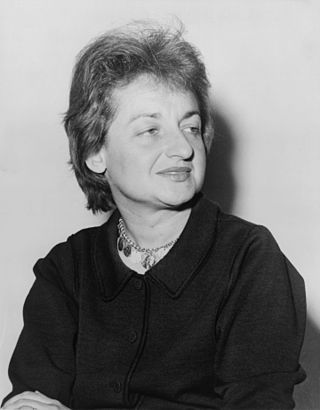
Betty Friedan was an American feminist writer and activist. A leading figure in the women's movement in the United States, her 1963 book The Feminine Mystique is often credited with sparking the second wave of American feminism in the 20th century. In 1966, Friedan co-founded and was elected the first president of the National Organization for Women (NOW), which aimed to bring women "into the mainstream of American society now [in] fully equal partnership with men.”
Liberal feminism, also called mainstream feminism, is a main branch of feminism defined by its focus on achieving gender equality through political and legal reform within the framework of liberal democracy and informed by a human rights perspective. It is often considered culturally progressive and economically center-right to center-left. As the oldest of the "Big Three" schools of feminist thought, liberal feminism has its roots in 19th century first-wave feminism seeking recognition of women as equal citizens, focusing particularly on women's suffrage and access to education, the effort associated with 19th century liberalism and progressivism. Liberal feminism "works within the structure of mainstream society to integrate women into that structure." Liberal feminism places great emphasis on the public world, especially laws, political institutions, education and working life, and considers the denial of equal legal and political rights as the main obstacle to equality. As such liberal feminists have worked to bring women into the political mainstream. Liberal feminism is inclusive and socially progressive, while broadly supporting existing institutions of power in liberal democratic societies, and is associated with centrism and reformism. Liberal feminism tends to be adopted by white middle-class women who do not disagree with the current social structure; Zhang and Rios found that liberal feminism with its focus on equality is viewed as the dominant and "default" form of feminism. Liberal feminism actively supports men's involvement in feminism and both women and men have always been active participants in the movement; progressive men had an important role alongside women in the struggle for equal political rights since the movement was launched in the 19th century.

Urvashi Vaid was an Indian-born American LGBT rights activist, lawyer, and writer. An expert in gender and sexuality law, she was a consultant in attaining specific goals of social justice. She held a series of roles at the National LGBTQ Task Force, serving as executive director from 1989-1992 — the first woman of color to lead a national gay-and-lesbian organization. She is the author of Virtual Equality: The Mainstreaming of Gay and Lesbian Liberation (1995) and Irresistible Revolution: Confronting Race, Class and the Assumptions of LGBT Politics (2012).

Islamic feminism is a form of feminism concerned with the role of women in Islam. It aims for the full equality of all Muslims, regardless of gender, in public and private life. Islamic feminists advocate for women's rights, gender equality, and social justice grounded in an Islamic framework. Although rooted in Islam, the movement's pioneers have also utilized secular, Western, or otherwise non-Muslim feminist discourses, and have recognized the role of Islamic feminism as part of an integrated global feminist movement.
Black feminism is a branch of feminism that focuses on the African-American woman's experiences and recognizes the intersectionality of racism and sexism. Black feminism philosophy centers on the idea that "Black women are inherently valuable, that liberation is a necessity not as an adjunct to somebody else's but because of our need as human persons for autonomy."

Barbara Smith is an American lesbian feminist and socialist who has played a significant role in Black feminism in the United States. Since the early 1970s, she has been active as a scholar, activist, critic, lecturer, author, and publisher of Black feminist thought. She has also taught at numerous colleges and universities for 25 years. Smith's essays, reviews, articles, short stories and literary criticism have appeared in a range of publications, including The New York Times Book Review, The Black Scholar, Ms., Gay Community News, The Guardian, The Village Voice, Conditions and The Nation. She has a twin sister, Beverly Smith, who is also a lesbian feminist activist and writer.
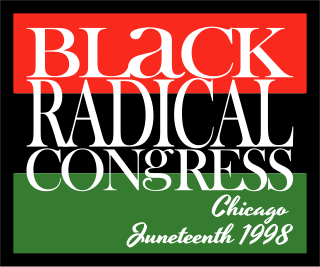
The Black Radical Congress (BRC) is an organization founded in 1998 in Chicago. It is a grassroots network of individuals and organizations of African descent focused on advocating for broad progressive social justice, racial equality and economic justice goals within the United States.

Kimberlé Williams Crenshaw is an American civil rights advocate and a scholar of critical race theory. She is a professor at the UCLA School of Law and Columbia Law School, where she specializes in race and gender issues.

The Evangelical and Ecumenical Women's Caucus (EEWC), also known as Christian Feminism Today (CFT), is a group of evangelical Christian feminists founded in 1974. It was originally named the Evangelical Women's Caucus (EWC) because it began as a caucus within Evangelicals for Social Action, which had issued the "Chicago Declaration". Its mission is to "support, educate, and celebrate Christian feminists from many traditions." It favored passage of the Equal Rights Amendment, encourages the ordination of women, and has called for gender-inclusive language in all communications. The word ecumenical was added to the organization's name in 1990 in order "to reflect the increasingly inclusive nature and the many traditions of [the organization's] membership".
Elsie Bernice Fisher was a civil rights activist and union organizer. She was among the co-founders of the Congress of Racial Equality (CORE) in 1942 in Chicago, Illinois.
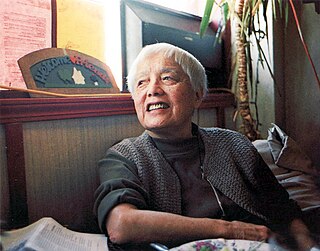
Grace Lee Boggs was an American author, social activist, philosopher, and feminist. She is known for her years of political collaboration with C. L. R. James and Raya Dunayevskaya in the 1940s and 1950s. In the 1960s, she and James Boggs, her husband of some forty years, took their own political direction. By 1998, she had written four books, including an autobiography. In 2011, still active at the age of 95, she wrote a fifth book, The Next American Revolution: Sustainable Activism for the Twenty-First Century, with Scott Kurashige and published by the University of California Press. She is regarded as a key figure in the Asian American, Black Power, and Civil Rights movements.

Latin American feminism is a collection of movements aimed at defining, establishing, and achieving equal political, economic, cultural, personal, and social rights for Latin American women. This includes seeking to establish equal opportunities for women in education and employment. People who practice feminism by advocating or supporting the rights and equality of women are feminists.
Labor feminism was a women's movement in the United States that emerged in the 1920s, focused on gaining rights in the workplace and unions. Labor feminists advocated for protectionist legislation and special benefits for women, a variant of social feminism. They helped pass state laws regulating working conditions for women, expanded women's participation in unions, and organized to oppose the Equal Rights Amendment.
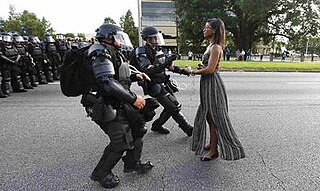
Taking a Stand in Baton Rouge is a photograph of Ieshia Evans, a nurse from Pennsylvania, being arrested by police officers dressed in riot gear during a protest in Baton Rouge, Louisiana, on 9 July 2016. The protest began in the aftermath of the shooting by police of Alton Sterling and Philando Castile. The image, taken by Jonathan Bachman for Reuters, became a viral phenomenon on social media, described by several media organizations as "iconic", with some comparing the image to well-known images of other lone protesters, such as the photograph of "Tank Man" in the Tiananmen Square protests of 1989.

Aileen Hernandez was an African-American union organizer, civil rights activist, and women's rights activist. She served as the president of the National Organization for Women (NOW) between 1970 and 1971, and was the first woman to serve on the Equal Employment Opportunity Commission.
The Global Feminisms Project, originated in 2002 and based at the Institute for Research on Women and Gender (IRWG) at the University of Michigan, is an oral history project led by a team of researchers at the University of Michigan that collects interviews of feminist activists representing seven countries including China, India, Poland, the United States, Brazil, Nicaragua, and Russia. The focus of the project is to record and archive the stories of females who are activists and scholars within the socio-historical context of their own countries, formed with curricular and research goals at its core. The sources provided lend themselves to comparative and interdisciplinary work, addressing issues that reach across disciplines and provide information regarding activism, historical context, identity formation, and social movements. The interviews are designed to explore the ways in which different forms of activism intersect at various, distinct time points within the history of the represented countries.

African American women of the Civil Rights movement (1954-1968) played a significant role to its impact and success. Women involved participated in sit-ins and other political movements such as the Montgomery Bus Boycott (1955). Organizations and other political demonstrations sparked change for the likes of equity and equality, women's suffrage, anti-lynching laws, Jim Crow Laws and more.
Sylvia Roberts (1933–2014) was an American lawyer known for legal work on behalf of patients at the East Louisiana State Hospital's Forensic Unit, for the National Organization for Women's (NOW) Legal Defense and Education Fund (LDEF), as an educator and advocate for the legal rights of women in Louisiana, and on the behalf of victims of domestic violence. Roberts is best known for representing Lorena Weeks in Weeks v. Southern Bell, the first legal victory in which the National Organization for Women used Title VII of the Civil Rights Act to fight gender-based discrimination.
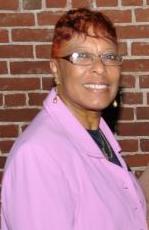
Patricia Haynes Smith is an American politician who served as a member of the Louisiana House of Representatives from 2008 to 2020, representing District 67. Smith is affiliated with the Democratic party. Her platform focused on promoting access to healthcare and other resources for underprivileged communities and improving education in public schools.
Shelton Tappes was an American labor organizer and civil rights activist, known for his role in drafting and negotiating the anti-discrimination clause included in the first contract between Ford Motor Company and the United Auto Workers (UAW.)
References
- ↑ Philp, Drew (2017-07-20). "No water for poor people: the nine Americans who risked jail to seek justice". The Guardian. ISSN 0261-3077 . Retrieved 2018-03-07.
- 1 2 Govenar, Alan B. (2007). Untold Glory: African Americans in Pursuit of Freedom, Opportunity, and Achievement. Harlem Moon/Broadway Books. ISBN 9780767921176.
- 1 2 3 4 Dujon, Diane; Withorn, Ann (1996). For Crying Out Loud: Women's Poverty in the United States. South End Press. ISBN 9780896085299.
- 1 2 3 "Transcript of Maureen Taylor and Marian Kramer Interviewer: Jennifer Lyle" (PDF).
- ↑ Written at U.S.A.. "Global Feminisms Comparative Case Studies of Women's Activism and Scholarship: Transcript of Maureen Taylor and Marian Kramer, Interviewer: Jennifer Lyle" (PDF). Global Feminisms Project. University of Michigan, Ann Arbor, MI. March 5, 2004. Retrieved March 4, 2018.
- ↑ Feeley, Dianne (30 November 2001). "A Revolutionary in the Auto Plant: In Remembrance of General Baker (1941-2014)". Solidarity. Retrieved 29 December 2019.